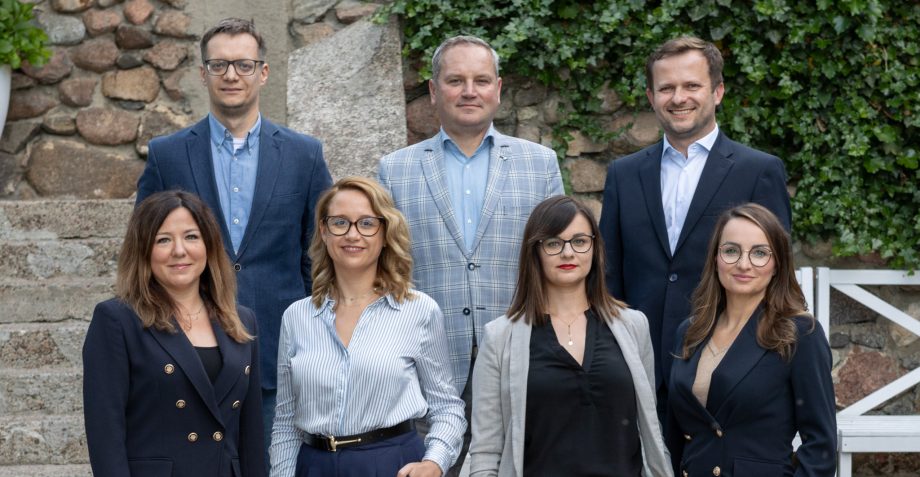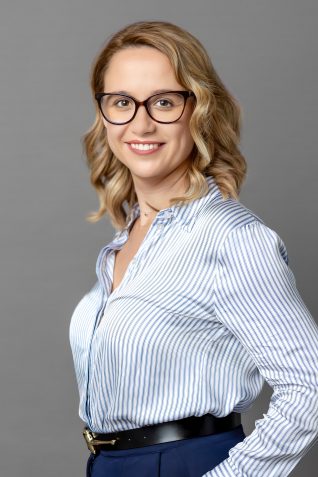
Standardised description and first microcredentials. Now in Odznaka+ app
The creation of microcredentials for the Odznaka+ application marks the completion of the first phase of the Educational Research Institute’s microcredentials pilot project. We talk to Martyna Leciejewicz, the key expert responsible for conducting the project, about the goals of this project, achievements so far and plans for the next phases.
microcredentials.pl: The first stage of the microcredentials pilot project is behind us, culminating in the issuance of the first microcredentials in the Odznaka+ application. Is this a good prognosis for the next stages of the project? In line with its initial assumptions?
Martyna Leciejewicz: Definitely yes! We managed to simultaneously conduct the first phase of the pilot, work on the standard for issuing microcredentials and adapt the Odznaka+ application to issue them. This is our great success and proof that we have done a lot of good work.
Our project is unique in its comprehensive approach to the topic of microcredentials. We do not only implement them, but at the same time, we create a Polish standard for their issuance and test their usability. This was and is the aim of the pilot – we check how a specific entity creates microcredentials, to whom it issues them, and what difficulties it may have in describing them. We solve problems together and discuss the best solutions.
This is important because each of the participants of the pilot project creates digital credentials based on different needs. For example, training companies offer certificates of completion of courses or training that they provide, while corporations create digital credentials related to the idea of ’learning at work’ or employee development path. These are just examples, but the catalogue of solutions we are working on is much broader.
microcredentials.pl: It seems that in such an undertaking, the most important are both proven resources and partners who, while understanding their own needs, see the value of the project you are implementing.
Martyna Leciejewicz: The team I lead developed the idea for the pilot’s operation as well as the categories of entities that might be a part of it. Its dispersed nature has proved to be effective. It’s a group of experts in microcredentials who live in various regions of Poland. This allowed us to provide both direct and remote help to our partners and companies cooperating with us. We were able to manage all processes more easily. And in this case, time is crucial.
One of our objectives was to launch the pilot as soon as the microcredential project got underway. Therefore, we invited entities that had previously participated in the project related to the Odznaka+ application to the first stage. We wanted it to be a diverse group, which is why we established cooperation with four institutions: Kyndryl, an international provider of IT services, Kodilla, a training company, the Polish Information Processing Society and Revas, a company dealing with the implementation of tools for practical learning of setting up and running a business.
microcredentials.pl: How did this pilot stage go? To what extent could the project experts provide assistance to the participants?
Martyna Leciejewicz: We have adopted an operating model in which each entity has two supervisors: the main and the supporting one.
We divided the pilot into two parts. The first one covers the time from the initial meeting to the signing of the contract. This is the time for our partners to get acquainted with the experts, and the project assumptions and confirm the terms of the contract. The second part begins after the contract is signed. During in-person and online meetings, this is the opportunity to discuss important project-related topics and learn how the Odznaka+ application that issues digital credentials functions.
While the majority of the pilot’s first phase was conducted in a traditional, analogue way, at the same time work was done to modify the application so that it could issue both microcredentials and badges. The pilot concluded with all our four partners preparing digital microcredentials.
It is worth remembering that each pilot is ‘tailor-made’. Our partners used different formulas. For instance, Kyndryl created its microcredential description in-house before collaborating with our specialists to improve it. Kodilla, in turn, chose online meetings. Each institution has slightly different expectations. We attempt to address all of them, e.g. by organising additional workshops on describing microcredentials or on using the Odznaka+ application.
microcredentials.pl: However, the partners and IBE microcredential teams are two different entities, operating in different conditions. How did this cooperation go? Have you encountered any particular challenges?
Martyna Leciejewicz: Naturally, the pilot participants kept us updated on their impressions. They were all positive. We care about the good atmosphere of our cooperation. Our goal is to make the process of issuing microcredentials as simple as possible, even intuitive. We viewed each opinion as an opportunity to check the accuracy of our assumptions and the work being done by all of our experts.
The actual challenge we faced was when, in addition to developing a standard for its description during the pilot, we were also both gathering feedback and suggestions from the participants and working on the Odznaka+ application to issue digital microcredentials. However, our project’s development team created a user-friendly microcredential generator that allowed every entity to create its own digital microcredential.
microcredentials.pl: The final result of the pilot is the issuance of digital microcredentials by our partners in the Odznaka+ application. In the end, what activities led up to this event and what are these microcredentials?
Martyna Leciejewicz: Each of our partners developed their own ideas for microcredentials and, with the support of our team’s supervisors, created its description and graphical representation. It is noteworthy that the pilot participants indicated their desire to issue more than one microcredential, which we naturally allowed to do so.
Indeed, they managed to create very interesting microcredentials. For example, ‘JavaScript programming basics – for programming school students’. This microcredential may be useful to holders in recruiting for jobs mainly in the IT industry, such as programming, software testing, website design and development, graphic design, UX (user experience) and UI (user interface) design. Other proposals include: ‘PMO Administration in Project Management (CRC) – for trainees’ and ‘ICDL (ECDL) BASE’, microcredentials to confirm basic skills in working on the internet, word processing, working with spreadsheets, working with computers. Another interesting proposition is the possibility of obtaining a microcredential after completing a course called ‘Revas Certified Trainer of Industry Business Simulations – Business Management – for trainers who deliver training’.
microcredentials.pl: The pilot’s second phase has started after the first one was finished. What plans are involved with it?
Martyna Leciejewicz: We are not slowing down and we are uninterruptedly beginning the next stage of our work. In this phase, we will have a group of partners four times larger than the previous one. It includes a strong representation of universities, such as the Opole and Wrocław Universities of Technology, as well as the CyberSkill training company, Commerzbank and the Jan Biziel University Hospital No. 2 in Bydgoszcz. There has been so much interest that we have had to move some applicants to the third stage of the pilot, which we plan to start in April 2025.
We are thrilled with the initial outcomes of our project and eager to work on the following phases. We are curious to see how universities will react to our proposed standard for describing microcredentials, and whether their needs will coincide with those of our other partners, such as business entities. There are a lot of interesting challenges ahead.

Bionote
Martyna Leciejewicz – key expert for the implementation of digital services in the project ‘Microcredentials – piloting a new solution to support lifelong learning’. She has been with the Educational Research Institute since 2018 and specialises in promoting lifelong learning and the development of digital competences as a foundation in a dynamically changing educational and professional environment. Her experience includes the management of distributed teams and the effective running of projects, especially those funded by European Union funds. She specialises in planning, coordination and implementation of EU projects. She is a graduate of Cardinal Stefan Wyszyński University and Kozminski University, where she completed her studies in Administration. She worked at Lazarski University for 10 years, gaining comprehensive experience in the development of the university’s international cooperation, especially in the area of foreign student support. She maintained relations with government institutions and consulates. She also developed her organisational and management skills in the corporate field, which enables her to effectively combine an academic and business approach. Privately, she is interested in literature, travel and confectionery.
